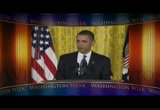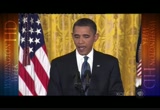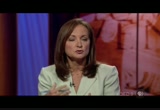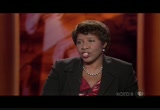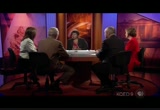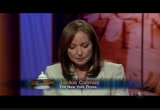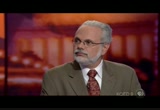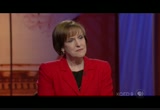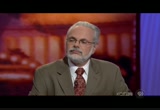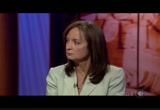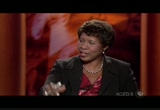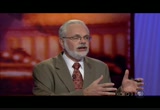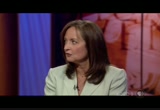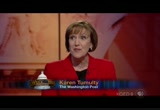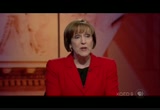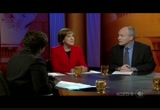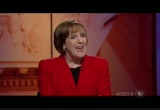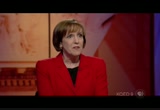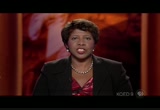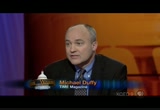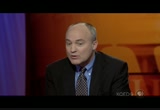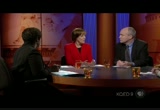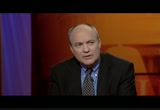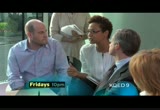tv Washington Week PBS September 11, 2010 5:30am-6:00am PST
6:30 am
gwen: the sum of our fears. the economy. the political landscape and the dilemma of distraction. all of our national insecurities on display. we take a look tonight on "washington week." battles on every side. all on display at a lunchtime presidential news conference. over the economy. >> the policies that the republicans have offer -- are offering right now are the exact policies that got us into this mess. >> i think it just shows how out of touch the white house is. the american people are asking the question, where are the jobs? >> over the coming midterm election. >> what i'm going to remind the american people of is the policies that we have put in place have moved us in the right direction. >> no apologies for opposing the stimulus, no apologies for
6:31 am
opposing the health care. no apologies for opposing what they call the wall street bill. gwen: and a sensational and distracting threat from an obscure florida pastor. >> we are simply burning a book. >> it doesn't in any way represent america or americans or american government or american religious or political leadership. >> we have to make sure that we don't start turning on each other. gwen: we'll put the roller coaster week in context with jackie calmes of "the new york times," david wessel of "the wall street journal" and michael duffy of "time" magazine. >> award-winning reporting and analysis. covering history as it happens. live from our nation's capital, this is "washington week" with again ifill. produced in association with national "journal," funding for
6:32 am
"washington week" is provided by -- >> we know why we're here. to connect our forces to what they need when they need it. >> to help troops see danger. before it sees them. >> to answer the call of the brave and bring them safely home. >> around the globe the people of boeing are working together to support and protect all who serve. >> that's why we're here. >> funding for "washington week" is also provided by exxon mobile , eharmony, the ethics and excellence in journalism foundation, the annanburg foundation, the corporation for public broadcasting and by contributions to your pbs station from viewers like you. thank you.
6:33 am
once again, live from washington, moderator again eye sfill -- ifill. gwen: good evening. once again and probably not for the last time, the president today tried to shift the national debate back to the issues most americans say they care about, their jobs, their taxes, their families. >> now, for all the progress we've made, we're not there yet. and that means the people are frustrated and that means people are angry. and since i'm the president and democrats have control of the house and the senate it's understandable that people are saying, you know, what have you done? gwen: true enough. and therein lies the fight. the president this week said no to extending bush-era tax cuts and yes to more government spending to stimulate the economy. here is republican response in a nut shell from congressman ross come. >> we see where expansive
6:34 am
government leads. it leads to a nagging unemployment rate of about 10%. gwen: it's a pretty bright de-dividing line but one that has not taken root in the american psyche or in washington. so what if any of these readies are going anywhere? >> well, we'll start with the president. in your intro you said that he said no to the bush tax cuts which is true for the upper income people and yes to more government spending. that's the perception that he's been fighting since the original stimulus. what he's actually proposed is three major steps, two of which are tax cuts for business, mainly corporations, that are geared toward not only toward trying to stimulate the economy, but toward getting republican votes. most people think he would fail, the democrats' calculation is that he would expose the republicans for what they say the republicans are doing, which is being so intent on denying the president any victories that they would even vote against things that they've been for in
6:35 am
the past. and, you know, i don't think anybody thinks, even the white house, acknowledges they don't really think this will happen before the election. and if even if it did, you wouldn't see results. maybe in a lame duck session, but that's a big if. gwen: ok, maybe i'm being naive here, but is there anything that the republicans, the opposing party, have to propose or is proposing that might be an alternative to what the president suggests will jump start the economy? >> one thing they're saying is it's a really stupid time to raise taxes, when the economy is so weak and it's an argument that apparently impressed the president's former budget director who wrote an op ed saying that the outcome was we extended the tax cuts for two years for everybody, that might be ok. and they are also courting the voters who think that the problem here is government spending by saying they would do a very sharp reduction in appropriated spending for things other than security. but it's not a very well plan
6:36 am
and a lot of the republican economists with whom i have spoken are a bit concerned that the republicans are running on a campaign of antiobama and an angry public, angry for very good reasons. and that may win them control of the house but it gith doesn't give them much of a governing agenda. it's a very different situation than in 1994 when gingrich took over and had a game plan. gwen: we're talking about insecurity and fear tonight, how alarming is it just the idea that many -- so many people, for instance, know someone else who can'tfight find a job? >> look, i think this is a -- can't find a job? >> look, this is huge. the economy is in terrible shape, it's growing again but very slowly. we have 9.6% unemployment. there's 6.3 million people who have been out of work more than six months. some of them may never go back to work and i think both the republicans and the democrats are sensing that the one thing that people want is somebody who has some assurance that i have a game plan here and they're both
6:37 am
jockeying for position. >> the question is, did the original stimulus fail and is that why he's proposing another one now? i think all the nonpartisan studies, the macroeconomists in the corporate world are all agreed that it helped. things could be worse. but that's a heck of a slogan to run on. now, you had quoted congressman roskum, the republican from illinois, at the outset of the program saying we have seen where expansive government leads. it leads to a nagging unemployment rate of about 10%. well, you know, i'd like david to try to tell me, see if we agree with the unemployment rate would be if you hadn't done the steps, if you, you know, the republicans opposed what obama did. >> i think the president's problem is that he promised people he would get them back to work. and they're not back to work. and so the question is, did we need, as you suggest, more medicine or did we use the wrong medicine? and you can do all the economic models you want but many
6:38 am
americans think what happened here is we had a big stimulus, it was somehow a lot of pork barrel spending to get through congress, we bailed out wall street, we didn't bail out main street and they want to know, where's the beef? >> today in the press conference there was a kind of undercurrent of questions that essentially goes like this, didn't you try to do too much? didn't you just take your eye off the ball when it came to the economy by doing health care as well? some other things in the first 18 or 19 months. do you think at the white house they think that? they never admit it but do you think they think they tried too much and they should have kept their eye more clearly on the economy now? >> i think that some of them do think that. i think the problem was they had a short-term economic focus and a very long-term focus on things like health care. and they kind of let the middle part take care of itself. they hoped by now the economy would be doing better and it wouldn't need more nurturing, that it would have achieved velocity from government support. it didn't and now they're forced to back up and say, oh, we didn't mean to let you think
6:39 am
that we crossed the economy off to the-do list. gwen: and we know that the white house chief of staff, emanuel did have qualms. it was clear health care was going to be a hard slot and wanted to do financial reregulation first. >> but, you know, to be the devil's advocate, so they had put in place by the first month in office, february, 2009, this nearly $800 billion, two-year economic stimulus plan. meanwhile at treasury they're working on the financial stability plan for the banks and the fed is doing the monetary policy. so, you know, they can do, they can walk and chew gum at the same time so these committees are taking up health care and these other things. i think they know that when the results are in in november, the big argument is going to be that they overreached. classic big party takes over congress. they overreach. but the argument, as david knows, is that, for doing health care, it's also a big deficit
6:40 am
reducer over a 10-year period. that's been their argument. gwen: we're only a year in. >> first it will increase the deficit. >> david mentioned the now famous op ed that peter orszag wrote in "the new york times" this week. what he argued was for a two-year extension of all the tax cuts, not so much on policy grounds but just because that's basically what you can get through congress, he thinks, at this point. is there a compromise here? because the president was sounding pretty inflexible this week? >> i think that's a bargaining position and one aimed at getting the democratic base out. i wouldn't be the least bit surprised if the outcome here is an agreement to extend the tax cuts for a couple of years. the orszag argument. >> all of them? >> all of them. the orszag argument was two years and then it's over. the president is not committed to raising taxes on people under $250,000. peter orszag thinks he's going to have to do that. >> it looks like he might have hardened a little bit today on. that both parties are trying to maneuver here to keep voters
6:41 am
happy. but when you actually look at the polls and ask them, what is it the voters really want the government to do, what's the answer? >> i think we've shown that you can't do economic policy by polls. we asked in our poll should the government do more or is the government doing too many things? evenly split. gwen: it seems like they're evenly split on tax cuts and whether the deficit's more important. but, 40% say that president obama's policies have made things worse. >> right. gwen: that's where the politics come. >> is that why they were so -- nobody in the white house now is willing to put the label stimulus on this latest package of measures and the president, he was willing to use it as a verb, but not as a noun. gwen: stimulate but not a stimulus. >> could you argue that it has become a prajortive. i can remember in mid 2009 when the republicans were already making headway, even as the economy looked and was growing
6:42 am
more than it is now. the republicans had the americans believing this is a big, $800 billion in spending instead of 1/3 in tax cuts. i remember a democrat saying to me, only the democrats could pass the biggest middle class tax cut in history and have it be called a spending bill. gwen: isn't that some of the frustration among some democrats? even today when the president was asked the questions like this, he gives nuance thoughtful answers but they're not something he can take out and throw like a piece of red meat. >> but the base problem the president has is his strongest argument is it could have been worse. he talked today in the press conference, we would have had a depression if we hadn't done all these things. as barny frank said, house financial services committee chairman, god's gift to economics reporters, because he's the only one who gives us laugh lines, he said no one ever got re-elected with a bumper sticker that said, it would have been worse if not for me. gwen: is part of that the nature of this recession is different
6:43 am
than what we've gone through before? is that part of the problem? >> yes. it was worse and we know that recessions that are caused by financial crises tend to be much more dangerous and the recovery more prolonged. the administration knew that, they honestly thought that they had done enough. they misdiagnosed the patient. and -- she said that -- one of the things she said to me as she was leaving, she thought that the prudent thing to say is, you do this and if you need more you'll do more later. it never occurred to her that they'd never get another bite of the apple. >> in fairness to her, when they sat down and even before president obama had been inaugurated as president obama, and they were looking at the range and the economy was worsening by the day, the range was $800 billion to $1.3 trillion. romer was asked the $1.3 trillion end of that scale. so, you know, she was way over optimistic on her projections but she also had argued for the higher amount.
6:44 am
>> is there anything in that conversation that suggests the republicans have a better aye approach? gwen: what is their approach? >> congressman boehner, the speaker in waiting for the house, had what he called -- called a two-point plan this week. one, cut spending to 2008 levels which of course is only spending for what they call discretionary spending which is everything the government does except medicare, social security and medicaid, which happen -- >> and not defense. >> and not defense and not homeland skiretscurte and the other thing was freeze tax rates. gwen: there was another revealing moment this week. president obama in cleveland. >> people are frustrated and they're angry and they're anxious about the future. i understand that. i also understand that in the political campaign, the easiest thing for the other side to do is to ride this fear and anger all the way to election day.
6:45 am
that's what's happening right now. >> yes. gwen: election day. you were talking about that. purple states are leaning red and blue states are leaning purple. so the president is heading out -- heading out on the campaign trail to states where house seats, senate seat, governor steets are sliding away from the democrats. you were in wisconsin this week. >> i was in wisconsin. gwen: what did you think? >> and the president was in wisconsin. the president has been in wisconsin quite a bit lately. he's been there three times in the last two months. wisconsin is a state that i think pretty recently people would not have thought was going to be a problem for the democrats. it's been, you know, closely fought in the past but president obama won it by 14 points in 2008. and russ feingold, the senator who is on the ballot this year, this is a state that has not sent anything but a democratic senator to washington since its first -- since it first sent
6:46 am
feingold in 1992. but all of a sudden russ feingold finds himself in the race of his life. so this state that democrats thought was going to be their insurance policy is really turning into a bell weather of how bad it is going to be for them in november. and there are two other states that are also like that. washington state and california. again, these are democrats who barbara boxer and murray, who everybody thought would be their insurance and now they're in races that are too close to call. gwen: if you're president obama and you fly to wisconsin or washington state or any of these states which are suddenly in flux, do the incumbents greet you at the airport or find a way to be someplace else in the northern part of the state? >> in fact, in wisconsin russ feingold was not there to greet the president, although he says he will be there the next time if it's possible. but his problem is much, as he's been a real independent thinker,
6:47 am
he is being tarred with the same brush everyone else is this year which is, if you're from washington, you're a washington insider and that is just about the worst thing anybody could be called. >> if there's anything the president can do to make a difference in these races? >> actually, what the democrats announced this week is that essentially they're going to try and make it feel like 2008 again. the president is going to barn storm the country, they're going to have these gigantic rallies in swing states like wisconsin and pennsylvania and ohio and nevada where harry reid is in the fight of his life. they're going to do what they're calling tervings, -- teletown halls where the president will speak to his core supporters. gwen: to get them to show up. >> to get them to show up. right now what they are trying to do is address the so-called enthuse yass much gap. most polls show that republicans are much more excited about showing up in november than democrats are. >> and if this -- is this really
6:48 am
like 1994 when the republicans took over or is it different? is obama doing something that bill clinton didn't do? >> you know, it's very interesting. i looked into that this week and i came across a part in president clinton's own memoirs where he said that he and his advisor had decided that the best thing he could have done for the democrats in 1994 was actually look presidential. his approval rating was over 50%, better than barack obama's is right now. and he tried to resist and he said, every time i'd turn around i'd find 10 more states on my schedule and he said that ultimately this kind of campaigning on the part of the president hurt the democrats more than it helped them. because while it made -- it made the basic -- base excited, it made everybody in the room excited, to the wider audience, he was not looking like the president, he was starting to look like just another politician. >> isn't there an argument in 1994, as now, that there really isn't anything -- can't not say
6:49 am
something, but there really isn't anything you can say that's going to change things when the winds are blowing like this? >> right now certainly -- certainly. there's things -- it seems like there's nothing they can do to the economy which is the main problem to make a difference between now and november. but the president is in a difficult spot because if he isn't out there on the road pushing as hard as he can to save the democrats and if things go badly as it looks like they might in november, there would be a lot of fingerpointing and recriminations the morning after. gwen: is it just me or does it seem like he's using john boehner's name, the speaker in waiting as you called him, the same way that republicans are using nancy pelosi's name? as kind of a slur to get people worked up? >> it's sort of difficult, though, because most people don't really know who john boehner is. i heard a number of democrats raising the question of why he went to cleveland, the city that john boehner had been to the week before, to respond to john boehner's speech.
6:50 am
the question being, you know, why is the president of the united states essentially elevating -- gwen: or lowering, which ever way you look at. that thanks. finally tonight, there was probably more ink spill, satellite time on one story more than any other this week thanks to a quirky florida pastor who vowed to burn a koran. then changed his mind and, to a still broiling dispute, about his islamic center plan for lower manhattan. a debate about islam expanded to include david petraeus, hillary clinton, robert gates and today at some length, the president. >> at a time when the country is anxious generally and going through a tough time, then fears can surface, suspicions, divisions can surface in a society. i've got muslims who are fighting in afghanistan. in the uniform of the united states armed services.
6:51 am
they are americans. and we honor their service and part of honoring their service is making sure that they understand that we don't differentiate between them and us. it's just us. gwen: it feels like we've been having this argument now for several weeks but only this week the president and his folks decide really to engage. why? >> well, time was running out. the pastor from gainesville had made it clear he was going to start burning books at 6:00 on saturday night on the night, anniversary of the 9/11 attack. demonstrations had already begun in afghanistan on thursday and u.s. officials were quite concerned about force protection there and other places in the far southwest asia. and then the pastor let it be known if someone called him and asked him and invited him to stand down that he might do so, if someone from the government and the white house saw its opportunities and bob gates put in a phone call and he has
6:52 am
desisted for the moment. this was not a constitutional question about protected speech. though a lot of people law that around. you can burn books in this country, you can burn flags. you can burn draft cards. >> why are you looking at me? >> i don't know. but there is also national security interests and with that -- without pushing one against the other, the government said, this is just more important, you have to protect these troops. the president said, that's my first responsibility and they leaned on the pastor. it would have been nice if someone said, this is a stupid idea, please stop. but he used a different argument. and as the president said today in the press conference, this is probably, we've been through nam of these this summer. this is about the third round of religious intolerance we've had, issues rise to the white house level. some of it probably has to do with, as the president diagnosed, general feeling of fear and discontent and anger in the country. certainly we've been in wars in the area for many years. but i think there's also a
6:53 am
political element about what happened today. there were politicians, sarah palin, newt gingrich, who have drawn a clear link between the koran-burning incident, it didn't happen, and the mosque building in lower manhattan. though they're not equivalent in any way, they drew that equivalency. >> speaking of the islamic center in lower manhattan that would also include a mosque, where do things stand on that? is that going to happen or not? >> today the president talked about it again for the third time. he was asked direct whether he supported it. today he seemed to move back a slight bit saying, i'm -- it's likely to building a church or a synagogue there. >> you don't think his comment today was strong er than his orange -- stronger than his original one? >> he was given a straight-up
6:54 am
opportunity to do it in front of a very large group of people in a high profile setting. it looked to me like he hardened it. but there are increasing concerns about the, i don't want to say -- the direction of the group and people behind it and whether they can or will stick to their plan. so it's still unfolding and adding stunt upon stunt this week, donald trump offered to buy the site. gwen: crazy week. >> it was just a nutty, nutty, almost by the hour kind of story. it's suggesting that it's not going to go away any time soon. >> you mentioned that tomorrow is the anniversary of 9/11. has this become a political holiday which politicians have to use it to take sides on? gwen: only in an election year. >> certainly this year it's anunavoidable and that's probably why the pastor did it. it's probably why the president's opponents stepped up their rhetoric about it. certainly the president today made several comments about how this was a time when we should use it as an opportunity to show
6:55 am
our tolerance, not just for the purposes of this. he said our troops who are muslims but also because it's something we can take away from 9/11. he called it, i think, national day of service tomorrow. >> we can -- gwen: we can only hope that this latest boil has been lanced and we'll talk about it again if it hasn't. thank you, everyone. keep up with us on facebook and twitter and at pbs.org and stay on top of daily developments on our news hour. join us next week on "washington week." good night. >> funding for "washington week" is provided by -- >> what if you could just be
6:56 am
you? what if you had your last bad date? what if she's out there? what if he's out there? what if you could be loved for exactly who you are? you can. >> funding for "washington week" is also provided by boeing, exxon mobile, the ethics and excellence in journalism foundation, the annanburg foundation, the corporation for public broadcasting and by contributions to your pbs station from viewers like you. thank you. ztecs,@st with a razos
248 Views
IN COLLECTIONS
KQED (PBS) Television Archive
Television Archive  Television Archive News Search Service
Television Archive News Search Service 
Uploaded by TV Archive on

 Live Music Archive
Live Music Archive Librivox Free Audio
Librivox Free Audio Metropolitan Museum
Metropolitan Museum Cleveland Museum of Art
Cleveland Museum of Art Internet Arcade
Internet Arcade Console Living Room
Console Living Room Books to Borrow
Books to Borrow Open Library
Open Library TV News
TV News Understanding 9/11
Understanding 9/11
